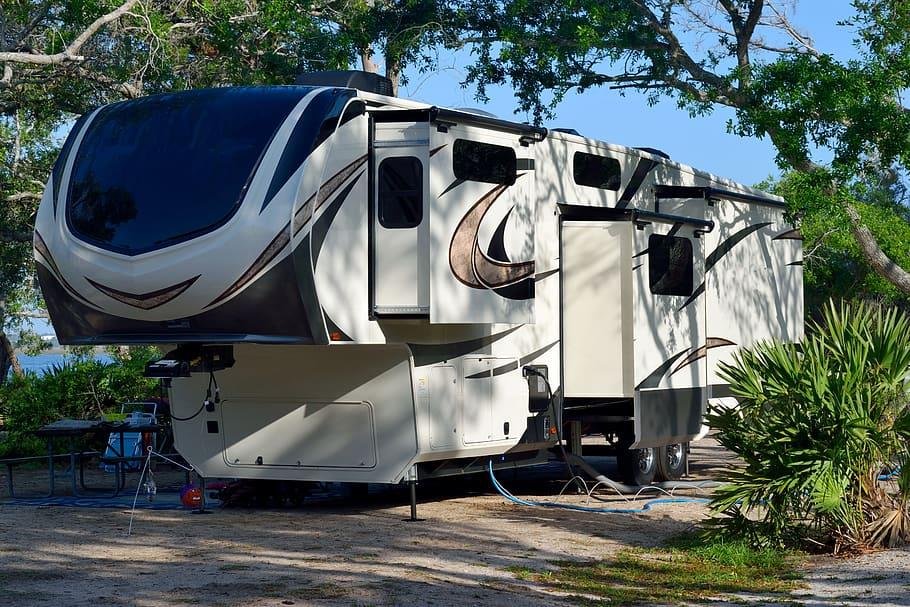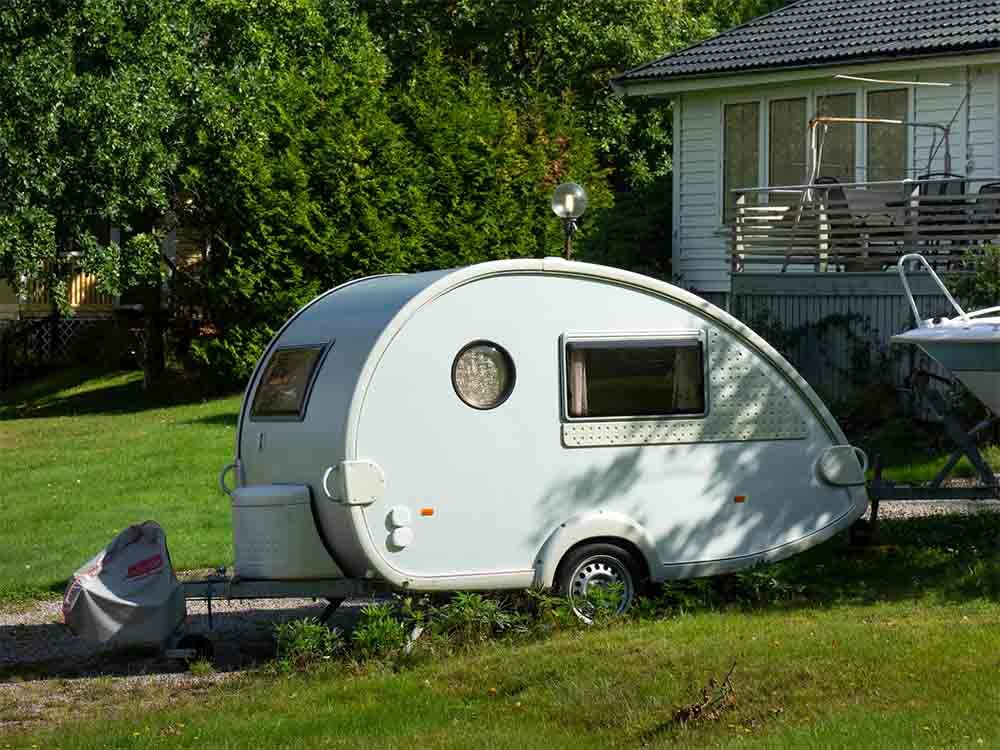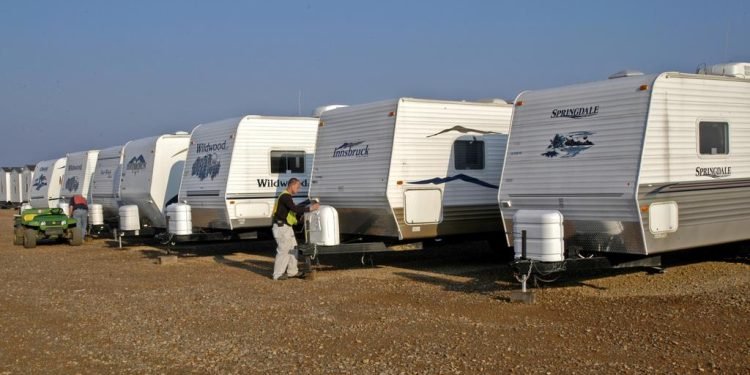Hit the open road, and adventure surely awaits you! But how do you want to explore those winding highways, untouched landscapes, and bustling cityscapes? A travel trailer, of course! But not just any trailer, you need one that suits your style and meets your needs. We’ve designed this comprehensive guide to help you understand the various types of travel trailers available in the market. So, sit back, fasten your seatbelt, and let’s embark on this journey.
What are Travel Trailers?
Travel trailers, commonly referred to as caravans, are towable recreational vehicles (RVs) that provide a place to sleep, cook, and relax while you’re on the road. Unlike motorhomes, they don’t have a motor and need to be towed by a separate vehicle. They come in various shapes and sizes, each with its unique set of features and benefits. But what are the different types of travel trailers available? Let’s dive in and explore.
The Different Types of Travel Trailers
Conventional Travel Trailers
Conventional travel trailers are the most common and popular type, and for good reasons. These trailers offer a variety of floor plans and can accommodate anywhere from two to ten people. As a result, they’re a popular choice for families and groups.
Some distinctive features of conventional travel trailers include:
Various size options, from 10 to 40 feet in length.
A range of amenities such as kitchens, bathrooms, dining areas, and multiple sleeping areas.
Some even come with slide-outs to increase the living space.
Fifth-Wheel Travel Trailers

For those looking for more space and luxury, the fifth-wheel trailer might just be the perfect fit. The term “fifth-wheel” refers to the hitch design, which mounts in the bed of a pickup truck. This unique setup allows for a multi-level floor plan and often results in more space than conventional trailers.
Key characteristics of fifth-wheel trailers are:
Multi-level floor plans, with the bedroom typically located in the upper level.
Spacious living areas with high ceilings.
Slide-outs for additional space.
Pop-Up Travel Trailers
If you’re a fan of camping but want a little more comfort and security, a pop-up travel trailer, also known as a folding trailer, might be a good choice. These trailers are compact, lightweight, and often collapsible for easy storage and towing.
Pop-up travel trailers commonly feature:
Pull-out bunks and a dinette that converts into a bed.
A compact kitchenette.
Some models even have a toilet and shower.
How to Choose the Right Travel Trailer for You
Choosing the right travel trailer depends on several factors such as your budget, towing capacity of your vehicle, and personal preferences. Here are a few tips to consider:
Evaluate your needs: Consider the number of people who will be using the trailer, how often you plan to travel, and the level of comfort you desire.
Consider your towing vehicle: Make sure your current vehicle can safely tow the trailer you’re interested in.
Plan your budget: Travel trailers can range from a few thousand to several tens of thousands of dollars. It’s important to factor in not only the purchase price but also the cost of insurance, maintenance, and storage.
The Underrated Types of Travel Trailers
While the conventional, fifth-wheel, and pop-up trailers are popular and widely recognized, some lesser-known types of travel trailers also deserve your attention.
Teardrop Travel Trailers

Teardrop travel trailers, named for their distinctive shape, are among the smallest and lightest in the travel trailer family. Despite their diminutive size, teardrop trailers offer a cozy sleeping area and an outdoor kitchen, making them ideal for solo travelers or couples who prefer a more minimalist approach to camping. Here’s what you can expect:
A sleeping area that typically accommodates two people.
An outdoor kitchen at the rear of the trailer.
Easy towing due to their compact size and lightweight design.
Hybrid Travel Trailers
Hybrid travel trailers offer the best of both worlds. They combine the hard-sided features of a conventional travel trailer with the expandable sleeping areas of a pop-up trailer. They offer more living space while still maintaining a compact size when closed for travel.
A few features you can anticipate in a hybrid trailer:
Expandable bunk ends, providing additional sleeping space.
Hard-sided living area with all the basic amenities of a traditional travel trailer.
Better fuel efficiency compared to larger, conventional travel trailers due to their smaller size when collapsed.
Toy Hauler Travel Trailers
For the adventure enthusiast, toy hauler travel trailers might be a perfect choice. These trailers have a built-in garage area for transporting “toys” like motorcycles, ATVs, and bicycles.
Features of a toy hauler trailer typically include:
A large rear door that doubles as a ramp for loading and unloading gear.
A garage area that can often be converted into extra sleeping or living space.
A separate living area complete with kitchen, bathroom, and sleeping quarters.
Considerations When Purchasing a Travel Trailer
Aside from the type of trailer, other factors should also be considered before making a purchase.
New vs. Used Travel Trailers
Deciding between a new or used travel trailer depends on your budget and comfort level with potential maintenance. While a new trailer will have the latest features and a warranty, a used trailer can be much more affordable.
Maintenance and Storage
Just like any other vehicle, travel trailers require regular maintenance. Additionally, you need to have a secure place to store your trailer when it’s not in use. These are significant considerations that can affect the overall cost of owning a travel trailer.
Insurance
Insurance is crucial for protecting your investment. The cost can vary based on the value of the trailer, how often it’s used, and where it’s stored.
Conclusion
Choosing the right travel trailer is about more than just the type of trailer. It’s about identifying your needs, understanding what each type of trailer can offer, and considering other factors like maintenance, storage, and insurance. By doing your research and asking the right questions, you’re sure to find the perfect travel trailer that will lead to many exciting adventures on the open road. Happy trails to you, and may your travel trailer be your gateway to an unforgettable journey!












